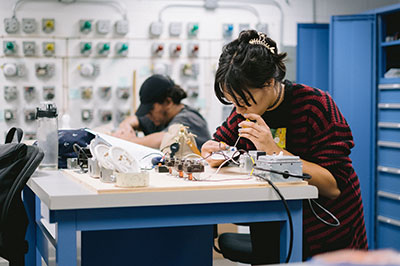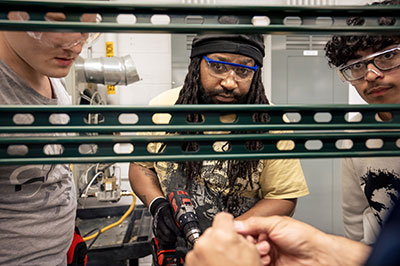What does an HVAC technician do?
An HVAC technician maintains healthy climates in homes and businesses.
HVAC stands for heating, ventilation and air conditioning. People who work in this field keep buildings cool in summer, warm in winter and well-ventilated throughout the year.
They provide safe and comfortable environments in which we live and work. Their role is vital: It’s hard to function when you’re shivering or overheated. And it’s essential to maintain buildings. When structures get too hot, floors and walls can warp, and mold may grow. Too cold? Pipes burst.
 Technicians who start a career in this trade can specialize in:
Technicians who start a career in this trade can specialize in:
- Residential heating – Service furnaces and heat pumps to keep homes warm. Plus, protect residents from carbon monoxide poisoning.
- Residential air conditioning – Maintain and repair AC units and heat pumps. Help homes stay cool and humidity levels low when it is hot outside.
- System installation – Remove old furnace and AC units and install new ones. Install or modify ductwork.
- Electrical troubleshooting – Diagnose problems with electrical circuits and components.
- Commercial refrigeration – Maintain and fix reach-in and walk-in coolers, freezers, ice machines and similar equipment. When you see the letters HVAC/R used, the R stands for refrigeration.
Where to get HVAC technician training
The College of Lake County (CLC) is one of the best HVAC training schools in Illinois. More students earn HVAC credentials here than at any other community college in the state, according to a 2024 Illinois Community College Board report.
Class sizes are small, so you get personal feedback from teachers. Instructors have real-world experience. They teach skills you can use with confidence in the field. Local employers offer apprenticeships and internships. This lets you earn money and gain experience while going to school.
Eight different degree and certificate programs are available. You can combine certificates to earn an associate degree in this field.
Depending on the program you choose, it takes one to two years to complete school. The cost ranges from $4,100 to $14,500. CLC offers financial aid and scholarships to help you pay for trade school. Workforce development grants are available for some students. Learn about financial aid.

In school, you will learn
- principals of HVAC/R
- how to work with refrigerants
- how to read electrical wiring diagrams
- how to install, maintain and repair systems and controls
You will learn to use tools and equipment in a modern lab, honing skills in
- electrical circuitry
- plumbing and pipefitting
- load calculation
- sheet metal fabrication
- flaring, soldering, brazing
- digital controls
Classes also prepare you to earn EPA 608 Certification, which you need to work in this field.
Is HVAC a good career?
Yes! The job market is strong for heating, air conditioning and refrigeration mechanics and installers. Employment is expected to grow 9% through 2033, reports the U.S. Bureau of Labor Statistics. About 42,500 jobs need to be filled each year.
Two things are causing this growth, states the Air Conditioning Contractors of America Association, an industry trade group. First, homeowners want more energy efficient heating and cooling systems. Second, more new homes are being built. That means more HVAC systems need to be installed and serviced than before.
How much do HVAC techs make? The typical salary is about $65,700 in Lake and Cook Counties. Find HVAC career outlook data from CLC. You may earn less starting out in this field. You earn more as you gain experience and take on supervisory roles.
Learn more:
Latest News
- Students earn seven gold medals at Illinois SkillsUSA competitionCLC students found success during the SkillsUSA state competition.
- In The News: Urban Farm director Eliza Fournier talks gardening tips on WBEZ ChicagoEliza Fournier, Urban Farm Center director, joined WBEZ Chicago to talk gardening tips for spring.
- 2025 graduates celebrate milestones and new beginningsNearly 500 graduates participated in CLC's 2025 spring commencement on May 17.
- New Southlake Dean champions student successCollege of Lake County proudly announces Dr. Tricia Rosado as the new Dean of Southlake Campus. She brings more than 20 years of higher education leadership focused on equity, student success and community partnership.
- In The News: Urban Farm groundbreaking featured in Daily HeraldA story covering the groundbreaking ceremony for the Urban Farm Center was written in the Daily Herald.
- In the News: Urban Farm groundbreaking featured in Lake County News-SunThe Lake County News-Sun published an article about the Urban Farm Center groundbreaking ceremony.






